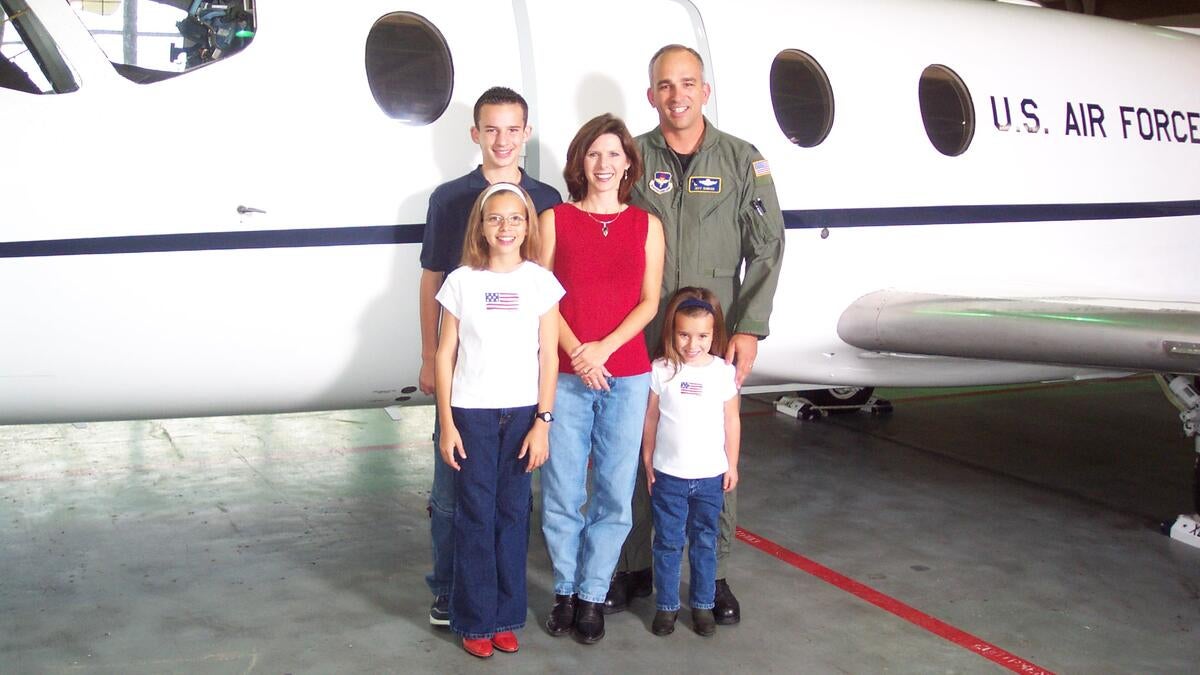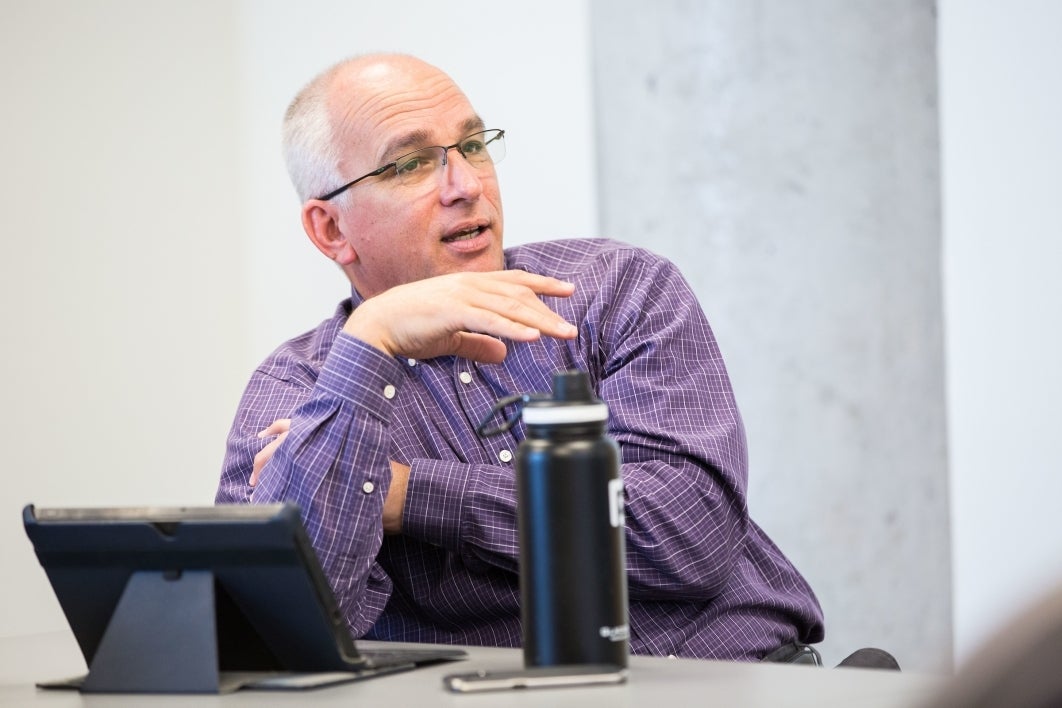Former Air Force commander uses experience to impart wisdom to students

Editor's note: This Q&A is part of a series of articles focusing on military veterans who are part of ASU's faculty. Over 460 veterans work at ASU, including 151 in the faculty and 312 who are university staff.
He is proof the old disparaging saying “those who can, do, and those who can’t, teach” is wrong: He has done it and taught it — and he continues to do so.
Retired Air Force Col. Jeff Kubiak is a professor of practice in the School of Politics and Global Studies and a senior fellow at ASU’s Center on the Future of War, and on a daily basis he challenges online graduate students on the complex aspects of global security.
A graduate of the U.S. Air Force Academy, Kubiak started his military career as a pilot. He excelled early, earning a spot as an instructor teaching pilot candidates to fly the T-38 Talon supersonic jet at the now closed Williams Air Force Base in Mesa — home today to ASU's Polytechnic Campus and Phoenix-Mesa Gateway Airport.
He went on to fly the B-1B Lancer heavy bomber before transitioning to key leadership positions within the Air Force, where he led teams, commanded the largest Air Force undergraduate flying training squadron and worked behind the scenes connecting real world military strategic plans to national security objectives.
Prior to retiring from active duty in 2011, Kubiak served as military faculty teaching at the U.S. Naval War College and later at the Air Force’s School of Advanced Aerospace Studies. After leaving the Air Force, he leveraged decades of military experience and a Tufts University PhD in international relations to teach the next generation of mid-level and senior military officers at the Army Command and General Staff School, and later at the Army’s School of Advanced Military Studies.
Kubiak brought his impressive credentials to ASU in 2016, where he now teaches courses and co-directs the online Master of Arts in global security program. He is one of 151 military veterans on the university faculty. Here, he gives a glimpse into his military career, describes his path to academia, provides advice to student veterans and shares his thoughts on ASU.
Question: How would you describe your time in the military? What was the experience like for you?
Answer: My career was something of a 30-plus-year accident. I attended the Air Force Academy not really knowing what I wanted to do. All I knew was that it was a very good school and I could hopefully play football. From that point on, every time I had an opportunity to get out, my wife and I decided that staying in was the best choice for us. I wasn't opposed to it, but I never planned it either. We simply moved from one assignment to the next doing the very best we could, raising a family and living. We stayed in because we were always surrounded by amazing people, the work was satisfying — and when it wasn't, it didn't matter because I changed jobs every year or two — and we always felt like we were contributing to something important. We created a lot of lifelong friendships and memories.
Q: How did your time in the service help or influence your academic career?
A: I started as an undergraduate thinking I would major in physics or electrical engineering. However, I took my first political science class in the spring of 1981 and I was so stunned and alarmed to find out what nuclear deterrence was, and how mutual assured destruction (MAD) was supposed to be operating, that I immediately became a political science major. I needed to learn more and become part of the solution to that absurdity. Well, I eventually became a bomber pilot and spent a week at a time sitting alert on bombers that were part of the U.S.'s nuclear deterrent. I was on alert in the fall of 1991 when President Bush stood down the bomber alert force. MAD hadn't ended but the tension it produced that drove me to study political science had subsided. I had thought that I wanted to teach political science at some point in my career, but every time I asked to return to the Air Force Academy to teach, the Air Force had other plans for me. Finally, after more than 20 years on active duty taught me that I was really meant to be a teacher, the Air Force thought it was time for me to get a PhD and teach at its premier school for strategists, the School of Advanced Air and Space Studies. That launched my academic career. When I retired, I taught at the Army's premier school for planners and strategists, the School of Advanced Military Studies, as a civilian before coming to ASU. Having undergraduate and master's degrees in American politics and a PhD in international relations, it was natural for me to focus my work on the domestic political context of U.S. foreign policy.
Senior fellow at the Center on the Future of War Jeff Kubiak gives feedback to a student presentation on the use of drones in war and surveillance at the Lattie Coor Building on Friday, Feb. 24, 2017. Photo by Deanna Dent/ASU Now
Q: Can you comment on your academic program specialty and its importance?
A: I co-direct the online master's in global security — the "MAGS," as we call it. The MAGS is just over two years old and is aimed at those engaged as, or hoping to become, practitioners in the security field in any fashion. This could be active duty military, intelligence specialists, policymakers at every level, members of nongovernmental organizations and other private and public practitioners. The program is designed to enable an interdisciplinary investigation of war, security and conflict in the contemporary global political environment. In our increasingly connected and globalized world, concerns about security and conflict reach into nearly every aspect of social existence. Through a broad curriculum delivered by expert practitioners and top-notch scholars, we strive to provide our students with the habits of mind and patterns of inquiry that enable them to act productively in the complexity of today's security arena.
Q: ASU has over 9,000 military-affiliated students. What advice would you give to them about academics or about their future?
A: The older I got, the more I came to realize that much of life cannot be planned. Serendipity — luck — plays a big role in all our lives. I was always told that luck was when preparation met opportunity. Your military experience and your education are outstanding ways to prepare yourself for what the future brings. ASU does an outstanding job presenting you with opportunities. Take advantage of as many of those opportunities as you can. Don’t dismiss any because you think they don’t fit you or you won’t be interested. Engage. You might not recognize the opportunity that turns your preparation into the little bit of luck you need to launch you into a successful future. Show up.
Q: Any parting thoughts?
A: There seems to be plenty of reasons one might be pessimistic about the future. The current age is filled with tremendous challenges for this country and human social existence. The very best thing about ASU is the nearly universal commitment of leadership, faculty, staff and students to actively seek solutions to the most demanding of those challenges. The culture of enthusiasm and innovation is contagious, and I am thrilled to have had the good fortune to have landed here.
Top photo: Then Lt. Col. Jeff Kubiak poses for a photo in 2002 with his family in front of a T-1 Jayhawk aircraft at Laughlin Air Force Base, Texas, in 2002. Kubiak commanded a T-1 squadron from 2002 to 2004. The Air Force uses the T-1 for undergraduate pilot trainees who are slated to fly cargo and air refueling aircraft. Photo courtesy of Jeff Kubiak
More Local, national and global affairs

Inspired by university tradition, a new lantern walk debuts with focus on mental health in the military
Arizona State University’s Lantern Walk is one of the school’s oldest and most treasured traditions. Each year, students, alumni and the Sun Devil community trek up “A” Mountain carrying lanterns to…
ASU-led study examines effects of political turmoil on young voters
Young adults approaching voting age in the U.S. are doing so in a political climate unlike any other.Over the past four years, growing party polarization and hot-button issues have been the topic of…

Foreign policy experts see Arizona as pivotal on world stage
America’s relationship with other countries is in flux right now, and Arizona, with its booming economy, is a perfect example of how foreign policy is inextricably tied to domestic issues, according…
